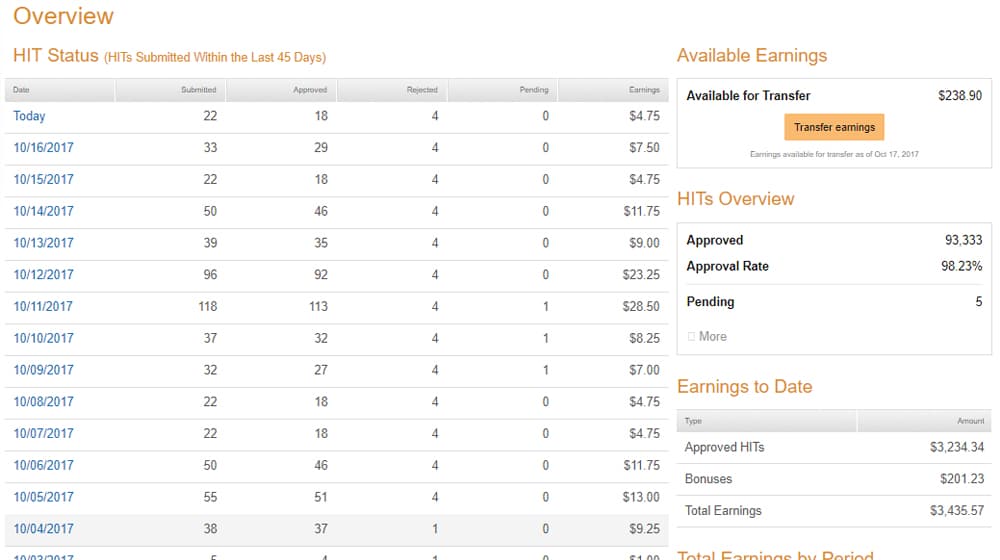Can You Use Mechanical Turk to Have Blog Posts Written?

If you're familiar with the online world of getting things done for money – that is, hiring people, outsourcing, and booking freelancers – you have probably encountered all manner of different ways to do it. When it comes to blog posts, you have a lot of options:
- You can hire a content marketing agency to run your blog and produce blog posts for you.
- You can hire a blog manager to run your blog and write for you, or hire their own writers to outsource content.
- You can hire a writer to be an on-staff worker to produce blog posts for you.
- You can hire a freelancer to write blog posts for your site, either sporadically or on an ongoing basis.
- You can use a high-end content mill to buy content.
- You can use a low-end content mill to buy content.
Yet there's one option you might have heard of that I haven't mentioned, either here or in the other posts I've written about these kinds of processes. What is it? It's Amazon's Mechanical Turk.
What Was the Turk?
If you're not familiar with it, I'm going to explain two things: what the original Mechanical Turk was, and what the modern one is.
Picture this. The year is 1770. You've never heard of things like computers, or television, or radio. Machines exist, but they're large, complex mechanical devices, meant to transfer human input into mechanical output. Then, someone comes along and says hey, I've got something to show you. You'll like it. It's a machine, a fake man, who can play chess.
"Alright, this I've got to see", you say, and you follow this guy to his office. There, there's a large wooden cabinet set up. This cabinet has a wooden man, dressed like a Turk; that is, a man from Turkey.
You're pretty good at chess, and figure any machine would have a pre-designed set of moves it can make. You can make some unexpected moves, throw it off, and win easily. So you sit down, and you try.
The machine wins.

Shocking, you think, but you remember how the game went. If it's a machine, it can't think. It can only do what it's designed to do. If you play a wildly different game, you should be able to circumvent it's moves and win. So, you try again.
The machine wins again.
Before you can flip the table over in a fit of rage, the man who owns the machine tells you it has one more feature; it can perform the Knight's Tour, a sequence of moves where a single Knight moves around the entire board, hitting every square once and only once. It's a parlor trick once you know it, but this machine demonstrates it with no input from the master; it just does it.
It's astonishing! Such a machine must be fantastically complex, and indeed, the man shows you inside the cabinet where complex machinery sits. This is a marvel of engineering! It's incredible! Such advances in machinery could mean incredible things for the future.
This is the exact sales pitch that was shown to the Empress Maria Theresa of Austria. This is the pitch that saw Napoleon Bonaparte lose to the Turk in chess. Benjamin Franklin lost to the Turk.
This 1700s computer was a modern marvel, so why did we not actually have real computers until the 1900s, 200 years later? That's the secret of the Turk.
The Mechanical Turk was indeed a machine, but it was largely hollow. Inside that machine sat a real person; a chess master who controlled the machine's movements from within. A skilled operator made the machine move mechanically, but it could "think" because the moves it made were guided by the chess master inside.
The Modern Mechanical Turk
The Turk was an illusion, the work of a magician and his assistant. It was a distraction; a "machine" that was never really a machine at all, but a man and a lie.
We see this time and again throughout history, and it happens in modern times as well.
- Facebook's content judgment algorithm is just people being outsourced, in inhumane conditions.
- A large part of Google's ranking algorithm is just a huge PDF of rules and an outsourced human workforce.
What we think of as "machine learning" or "the algorithm" in many cases is just people, hidden from view, doing the work.
In 2001, Amazon filed a patent for a Mechanical Turk-like service. "Artificial artificial intelligence" was the term they used for it; pretending that their service used AI to perform tasks when it was really just humans on the other end.

The service finally launched in 2005. From the client-facing end, it was a human resources machine. If you had a task you needed to be performed, be it data entry, writing, or even internal Amazon tasks, you could hire the Turk to do the work.
From the freelancer side, Mechanical Turk was – and is – a platform where you can claim individual tasks, called HITs or Human Intelligence Tasks, and perform them. They would pay you some small fee, and by completing enough tasks, you could earn enough money for a payout.
Amazon is more upfront with their "algorithm" being humans and providing the service, but the concept remains the same. Tasks too complex for a machine were outsourced to a "machine" made up of humans hidden from view.
The Rise and Fall of Mechanical Turk
Mechanical Turk – which I'm just going to use to refer to Amazon's service, not the original machine – very quickly became a popular tool. Hundreds of thousands of people, companies, academic institutions, and other groups offered up lists of tasks, ranging from identifying the difference between work-safe and not work-safe images, to data entry, to psychological surveys.
The benefit to companies was immense. They could have complex or time-consuming tasks completed for them for a very low fee. They wouldn't have to develop software or implement a programmatic solution, or even hire employees to do the work; they could just access the Mechanical Turk system and get it done, often much faster, for a much lower budget than they otherwise would.

Indeed, Amazon quickly racked up hundreds of thousands of people willing to perform this work, people from all around the world.
In the beginning, MTurk was a powerful system and a great way for a lot of people to make a living, even if that living required long hours of constant work with little downtime. It could still be considered a way to make a living.
These days, and really for the past five or more years, MTurk has not been what anyone would call a valuable place to work. If you consider that low prices are what attracts people to Amazon's system (both eCommerce and their cloud computing services), and consider the giant pool of available workers that increase the competition, you'll start to understand the immense downward pressure on the individuals willing to perform the work.
Pay rates are, to put it nicely, abysmal. Some of the "best" HITs pay $1 for 10-15 minutes spent taking a survey or filling out some data entry. Many pay much less. It's not uncommon to find tasks that take 1-2 minutes to complete, but which only earn you a few cents.

Add to this the fact that, for many tasks, a Turker has to apply and qualify to do it properly, and the sheer amount of time it takes to make money becomes much too high. If you think a $15 per hour minimum wage is still awfully low to survive on in America, imagine making $4 an hour from Amazon's system. It's no surprise that the quality level of the people working on the Turk has dropped dramatically.
Some kinds of work, this is fine. Simple summaries, data entry, and repetitive tasks are easy to get people to do for cheap, and the people doing it are willing to do it because they live in low cost of living areas, like Bangladesh, parts of India, Pakistan, and the Philippines.
Turkers are foreign, but also domestic. Many of them are poor, desperate, unemployed, or simply use it to make some extra change an hour or two per day. Some of them use Turk for fun or as a hobby, use it for beer money, or use it to buy a video game every few months. The demographics are pretty interesting and challenge some assumptions, but one thing is clear; the pay rate is terrible. The average pay rate for most Turkers is $2 an hour, and unlike restaurant workers, they can't earn tips.
The few Turkers who are serious about the platform have a range of software tools to alert them to high paying HITs and quick tasks they can do to earn money. Even then, the top earners still make a very low wage, around $1,000 a month for part-time work. In some areas of the world, this is a comfortable living, but in others it's completely unsustainable.
Using Mechanical Turk for Writing
What does any of this have to do with blog writing? After all, you came here for a specific question. Can you use Mechanical Turk to get blog posts written for your site?
Mechanical Turk has a wide range of people using it. Some of them are unemployed workers in India. Others are self-employed and successful entrepreneurs using it as a supplemental source of occasional income.
If you want a blog post written, you have a few issues to contend with.
First, you have to set pay for the post. The primary benefit of Turk is that it's cheap. Your pay rates can be low, lower even than the lowest star ratings on places like Textbroker or Writer Access. You won't be paying much, but as the adage goes, you get what you pay for.

Any decently paying HIT is going to be snapped up almost immediately. You have very little control over who picks it up. You can set some qualifications, but the stricter your qualifications, the fewer people are available to pick it up. In fact, among seasoned Turkers, one top piece of advice is to avoid HITs with qualifications. After all, if they have to spend time applying to see if they qualify, that's time they aren't working on other HITs to make money.
Don't forget that Amazon takes a cut as well, of 25-40% of the cost.
Thus, right at the outset, you're working with a very narrow pool of people, many of whom are under-qualified to do the work you're asking them to do. You're probably going to get writing that is churned out in a matter of minutes.
Another flaw in the scheme is that it's not a platform designed for writing. There are no protections in place. If you want a blog post written, someone could easily send you back a blog post they copied or spun from an existing post, and you don't have recourse to challenge it. There's no Copyscape integration to prevent these kinds of issues from cropping up. At the same time, the low cost makes it make financial sense for the Turkers to save every second they can, and writing? Writing is time-consuming.
Can You Use Mechanical Turk for Blog Writing?
Can you? Sure. There's nothing stopping you from using Mechanical Turk to get some blog posts written for your site. There's nothing in the Amazon rules for Turk, and there's nothing stopping Turkers from doing the writing for you beyond their own sense of what's worth the time.
Should you? No. Absolutely not. The kind of writing you get from a low-quality content mill is better than what would be churned out and thrown at you by the Turk system. It's simply not worth the time to write anything good, not to the people who want to make real money from Turk.
You can certainly get writing from Turk. Will it be on-topic? Will it be proofread? Will it be unique? Will it be valuable? Almost certainly not. The chances of you getting anything of value out of Mechanical Turk are slim to none.
What is Turk really used for? Much more menial tasks. If you have a pile of images you want to be categorized, you can have Turk categorize them. If you have data entry you want to have done, you can pay for it to be done for you. If you have an academic survey you want responses to, you can pay a few hundred people to respond to it for a few dollars total. Anything complicated or requiring critical thinking and experience? You will almost certainly be disappointed with the results.










October 27, 2020
Good to know. Seems this is best for tedious or menial tasks and not really for critical thinking assignments.
November 01, 2020
Hi Steve! Yeah, Mechanical Turk isn't quite what it used to be either and it's primarily used by people who speak English as a second language, or not at all. You could have articles written on there, in theory, but they would sound a little funny and would be written in a hurry. The end product would almost be something that I wouldn't recommend publishing on your site for search engines to evaluate.
March 09, 2021
Interesting! It doesn't sound like the content quality makes this a worthwhile approach but I admire the ingenuity.
March 12, 2021
Hi Cara!
Indeed, any time you make speed a priority with something sensitive like a blog post, quality is sure to suffer.
There’s also nothing that checks for plagiarism, grammar issues, or other measures of quality.
You also can’t pick who is going to be assigned to your topic.
It’s certainly not a worthwhile approach, but it’s something we’ve seen pop up a couple of times and thought it was interesting enough to talk about it.